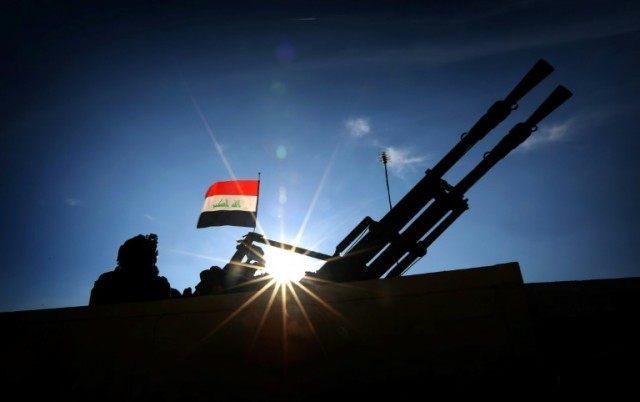Kurdish Peshmerga forces fighting alongside the Iraqi military on the mission to liberate Mosul from the Islamic State warn that the Iraqi army is “too weak” to fight ISIS, even with its advanced weaponry, while the Peshmerga is better trained but ill-equipped to fight alone.
Nazim Zinal, a Peshmerga military source, tells Kurdish outlet Rudaw that the Iraqi army is simply not a potent enough force to keep the fight going, hence the slow start to the recapture of Mosul. “With all the ammunition they [the Iraqis] have ultimately they are too weak,” he argued, noting that if the Peshmerga were armed as well as the Iraqi army “We would have been near Mosul by now.”
“They [the Iraqi army] are not as fast as the Peshmerga who can make advances with basic weapons. They don’t make any progress even with their modern weapons,” Peshmerga Lieutenant Farid Sabir added.
The Iraqi military announced that its army had begun the mission to recapture Mosul on Thursday. A city of an estimated two million people before the arrival of ISIS, it is one of two major urban centers controlled by the terror group, the other being Raqqa, Syria. The Iraqi military announced it had “recaptured several villages” near the city and would be working alongside a U.S.-led coalition fighting from the air. Shiite militias would also be involved in the ultimate battle for the city.
“The first phase of the Fatah [Conquest] Operation has been launched at dawn to liberate Nineveh [province], raising the Iraqi flag in several villages,” an Iraqi military statement read.
The mission appears to be going slowly, as the Islamic State left the villages it abandoned full of mines and other traps designed to kill civilians returning to their homes and opposing soldiers. According to the Kurdish outlet Bas News, at least eight villages have been liberated in the greater Mosul, area, however: Motantar, Tel Sha’eer, Karmrdi, Nasr, Khatab, Koudila, Salahiyah, and Nazra.
While the various militias are expected to work together to surround Mosul, tensions between Kurdish forces and those controlled by Baghdad have endured for years. The Peshmerga have often complained of Washington’s policy to only arm the Iraqi army and send weapons to the Kurdish forces through Baghdad, rather than directly through the Kurdistan Regional Government’s (KRG) headquarters in Erbil.
In February, the KRG admitted it had begun accepting munitions from Iran, describing it as the “first country to provide us with weapons and ammunition” directly. Kurdistan Region Security Council head Masrour Barzani, son of President Masoud Barzani, complained then of U.S. support for the Iraqi army over the Kurdish forces. “90 percent of the burden for this war is on the shoulder of the Peshmerga, 90 percent of the work is done by the Peshmerga, but we are only getting 10 percent of the armaments,” he argued. The shipments received in the last months of 2015, he protested, were “not even close to what we were asking for.”
In February, the peshmerga made public statements questioning whether a battle for Mosul would happen within any reasonable timeframe. “Officials from the central government have been talking about the battle for Mosul for a long time, but they [the Iraqi army] are not fully prepared for this battle since their missions are not fully finished in Anbar province,”Jabar Yawar, Chief of Staff of the Peshmerga Ministry said then. Less than a month since he aired his concerns, the capture of villages around Mosul has begun.
In addition to concerns regarding the preparation of Iraqi troops and equipment used by peshmerga, the participation of Shiite militias may also cause discord. Baghdad has friendly relations with rogue Shiite militias in Iraq, many with ties to Iran, but the peshmerga do not. On Thursday, the same day the operation to retake Mosul began, peshmerga clashed with Shiite forces in Salahaddin province, preventing them from entering a Kurdish-controlled town.
While the Shiite militias have vowed to participate in the fight against the Islamic State, they have refused to do so with American help, and warned they would shift their focus entirely to fighting Americans should the U.S. send Special Operations forces to Shiite-controlled areas.

COMMENTS
Please let us know if you're having issues with commenting.